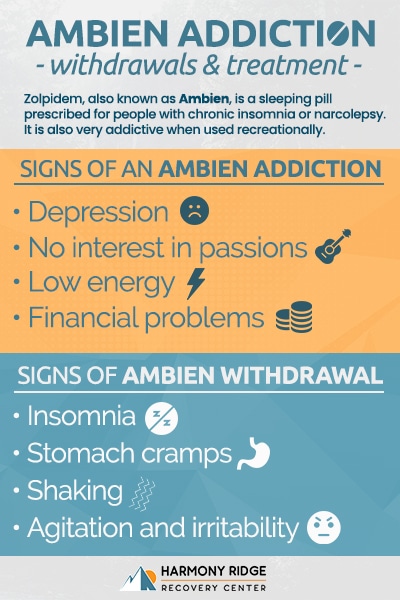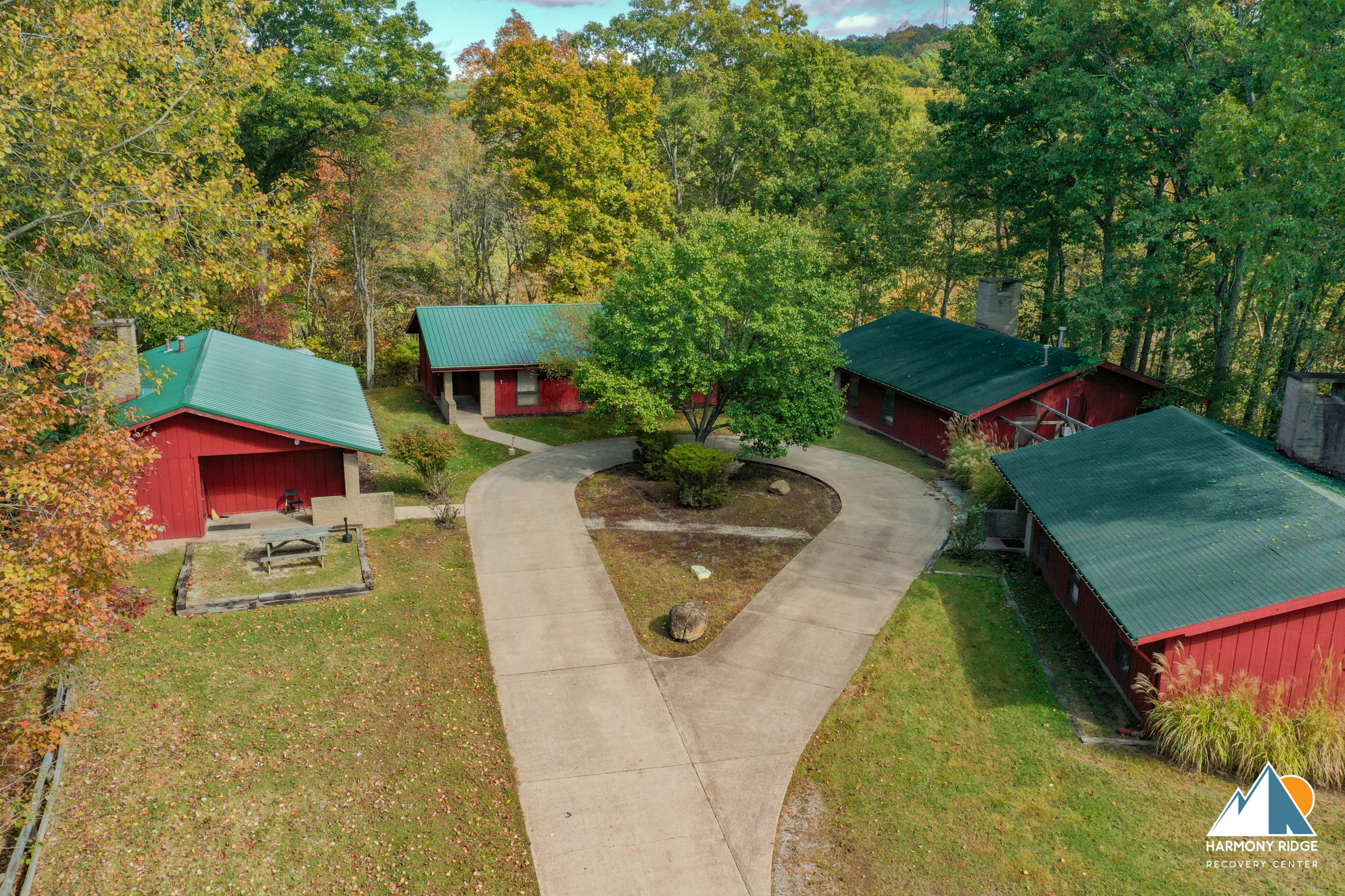Ambien Withdrawal and treatment
If you or someone you know needs help with Ambien addiction, don't hesitate to reach out to us. Let us be your partner in this journey toward healing and a healthier, more fulfilling life.
Zolpidem, also known as Ambien, is a sleeping pill prescribed for people with chronic insomnia or narcolepsy. It’s typically only used short-term, and if patients still need treatment, doctors will recommend an alternative therapy or medication. Ambien is a sedative, which means that it relaxes the central nervous system (CNS) to help you fall asleep.
Unfortunately, this medication can be highly addictive if used recreationally or more than prescribed. People under the influence of Ambien are most likely to engage in dangerous behavior and succumb to the drug’s hypnotic effects. If you suddenly quit using it, you can develop Ambien withdrawal symptoms.
Harmony Ridge Recovery Center can provide you with effective treatment that will help alleviate your Ambien withdrawal.
Side Effects of Ambien
Of all the side effects reported by those taking Ambien, the loss of memory after engaging in risky behaviors is the most disturbing. People report activities such as driving, eating, walking, and having sex without any recollection the following morning.
The risks of engaging in these types of activities while asleep are dangerous to those taking the medication and to those around them. People experiencing these side effects are at high risk for getting into an car accident, choking, falling, or contracting a sexually transmitted disease.
Other side effects of Ambien include:
- Fatigue
- Nausea and vomiting
- Headache
- Delusions or hallucinations
- Amnesia or short-term memory loss
Those who are pregnant should be aware that taking Ambien during the last three months of pregnancy may cause drowsiness or breathing problems in a newborn. Additionally, it might not be safe to breastfeed while taking Ambien, so be sure to ask your doctor about any risks.
Is Ambien Addictive?
Ambien is not considered an addictive medication. However, those who do not follow dosage instructions or take the medication longer than intended, put themselves at greater risk for developing an Ambien addiction. Ambien is intended to be used for short periods of time – one to two weeks to treat insomnia. Ambien targets receptor cells in the brain that respond to gamma-aminobutyric acid (GABA), a neurotransmitter that affects sleep cycles, emotional responses and levels of consciousness.
When a person continues to take this medication beyond the recommended amount of time, they are at greater risk for developing a dependency on the drug. For example, a normal dose for Ambien is one 10mg tablet before bed. Someone who has been taking Ambien beyond the one- to two-week period will likely need more of the medication to achieve the same effect, resulting in a person taking more than directed by their doctor.
Over time, the problem only worsens as some people enjoy the “high” or anxiety-easing effects that Ambien provides. In severe cases, people will build a strong tolerance to Ambien, resulting in taking 10 to even 20 tablets in one day. Those who have a family history of addiction are at greater risk for developing an addiction to Ambien.
Although it is not common for a person to develop an Ambien addiction, it is not unheard of. Those using the medication beyond the two-week recommended duration and increasing the amount taken are at a significantly greater risk for developing an addiction. Additionally, those taking Ambien without a prescription are at higher risk for developing a dependence.
Signs that indicate you or a loved one has developed an Ambien addiction include:
- Depression
- Low energy
- Little to no interest in once-enjoyed activities
- Compulsive desire to obtain the drug
- Unsuccessful attempt to decrease or cease use
- Social and interpersonal issues
- Financial problems
- Doctor shopping in order to obtain more of the drug
What Happens During Ambien Withdrawal?
Unfortunately, there isn’t too much information about Ambien withdrawal. However, symptoms usually last anywhere from one to two weeks.
Many people experiencing Ambien withdrawal will doctor shop to get more medication. Those who develop an addiction for the drug should not suddenly stop using the medication as symptoms of withdrawal are unpleasant and can result in drug relapse.
Signs of Ambien withdrawal include:
- Insomnia
- Agitation and irritability
- Cravings
- Delirium
- Stomach cramps
- Nervousness
- Shaking
Symptoms of Ambien withdrawal include:
- Insomnia
- Stomach cramps
- Shaking
- Irritability
- Restlessness
- Sweating
- Muscle cramps
- Nausea
- Vomiting
In less than 1% of Ambien withdrawal cases, people can have seizures. This happens more when people quit the drug “cold turkey,” meaning they stop using it without medical detox.
Due to the wide range of potential Ambien withdrawal symptoms, it’s best for those seeking to taper off from this medication under the guidance and supervision of a licensed medical treatment center like Harmony Ridge. This is the safest and most effective way to discontinue the use of this drug.
Ambien Withdrawal Timeline
The worst Ambien withdrawal symptoms usually happen within the first three to five days, and psychological symptoms can last up to two weeks.
It’s not easy to pinpoint exactly how long Ambien withdrawal symptoms will last. The intensity and type of symptoms you experience will depend on a number of factors, including:
- Your Ambien dosage: Taking more Ambien than you’ve been prescribed will lead to you developing a tolerance
- The length of time you took Ambien: If you only take Ambien for a short time (the prescribed time), you shouldn’t experience any withdrawal symptoms. If you do take it longer than prescribed, you’re more likely to have Ambien withdrawal.
- Taking other drugs/medication in combination with Ambien: When you ingest alcohol or drugs while taking Ambien, they can have a dangerous interaction. These can enhance the effects of the medication and increase the high. You’ll likely have withdrawal symptoms if you stop taking all of these at once.
- Whether you took Ambien or Ambien XR (extended-release): Ambien XR works slightly differently from regular Ambien, as it offers a higher dosage. Even though chemicals from Ambien XR are released more slowly, people who abuse it can take a large dose and bypass the chemicals that slow this release. This form of abuse can lead to withdrawal.
Treatment for Ambien Withdrawal
Our detox facility provides 24-hour medical support for patients experiencing Ambien withdrawal symptoms.
At Harmony Ridge Recovery Center, the highest quality of patient care begins as soon as you walk through our doors. We understand that those seeking help may be nervous, unsure, or even scared about treatment. We want to relieve you from all pain, suffering, and fear during your time with us.
Our compassionate team of medical professionals understand that patients are often apprehensive upon arrival. We go above and beyond to make our patients feel comfortable, welcomed and safe in our care. Patients should expect to receive varied levels of treatment based on their needs.
Detox
The first step of treatment is medical detox. The detoxification process involves eliminating all drugs and toxins from the patient’s body. This process can range from a few days to weeks, depending on the severity of the patient’s drug dependency as well as the drug that was being abused.
Should a patient experience any Ambien withdrawal symptoms, our medical team will assess the patient and may administer drugs to reduce any pain or discomfort a patient may be temporarily experiencing. Patients undergoing detox will receive 24-hour medical support — meaning they’ll never be alone — to ensure a safe and effective detox.
Our medical team will most likely have you taper off Ambien, giving you less and less doses of the medication over time.
Quetiapine (Seroquel), an antipsychotic that treats schizophrenia, depression, and bipolar disorder, has been used to treat Ambien withdrawal. Most medications you’re prescribed, though, will be short-term mood stabilizers or anti-seizure drugs, like the benzodiazepine clonazepam (Klonopin).
If you have an Ambien addiction, you must not try to detox from this medication at home or quit “cold turkey.” Since Ambien is a sedative, it’s important that you pursue medical detox at a treatment facility like Harmony Ridge.
Intensive Outpatient Program
Our least restrictive treatment option, intensive outpatient (IOP) will allow you to return home after attending treatment during the day. This is best for those who have had mild Ambien withdrawal symptoms. IOP allows our patients the most independence. By living at home, they can learn how to transition to life after addiction. Having a supportive family environment is crucial to helping you learn how to be sober.
Partial Hospitalization Program
Our partial hospitalization program (PHP) delivers a similar intensity and structure to our inpatient treatment program, with the exception that patients are able to return to a home-like environment at night. Often described as a middle ground between residential and outpatient treatment, PHP is the ideal program for those wishing to return to a home-like setting without forgoing the level and intensity of their medical treatment.
Residential Treatment
Residential, or inpatient, treatment is the most intense level of care following medical detox. This is the time where patients can focus completely on themselves and the recovery process. Harmony Ridge Recovery Center uses a combination of group and individual therapy sessions, counseling, cognitive behavioral therapy, and relapse prevention to treat Ambien withdrawal.
Patients respond well to the intense and highly structured program designed to help them overcome triggers and temptations that they were previously unable to overcome. Residential treatment will give you the caring environment you need to safely recover from Ambien withdrawal.
You might also find recovery groups to be helpful, especially if you’ve been abusing other drugs with Ambien. Narcotics Anonymous (NA) and Alcoholics Anonymous (AA) can introduce you to other people who have problems with drinking or drug use
Under continued 24-hour medical supervision, patients who have overcome the worst Ambien withdrawal symptoms focus on overcoming their addiction in a longer-term holistic treatment.
Holistic Treatment
This treatment focuses on healing the entire body, mind, and soul instead of one part of the body. Advocates of holistic treatment believe that natural remedies are more effective than medication. Techniques like acupuncture, massage, yoga, and tai-chi can provide many people with inner healing and peace as they journey through recovery. Herbal remedies, in addition to art and music therapy, have also been known to help people overcoming addiction.
Some patients might find that a combination of evidence-based and holistic therapies work for them. After performing an evaluation, our representatives will determine the best course of treatment for your needs.
Find Help for Ambien Withdrawal in West Virginia
Harmony Ridge Recovery Center will provide you with all the tools you need to overcome Ambien withdrawal. Our dedicated staff knows what you’re going through and will make you feel comfortable every step of the way.
Contact us today to learn more about our services. We can give you quality treatment in West Virginia that will help you say goodbye to addiction. It’s not too late to get help!
References:
https://www.mayoclinic.org/diseases-conditions/insomnia/expert-answers/ambien/faq-20058103
https://www.health.com/health/condition-article/0,,20449797,00.html
Jump To Section
Begin Your Journey to Healing Here
Ask me about recovery, I can help you!
Our recovery specialists are standing by 24/7 to help you or your loved one.
Or call us: 




